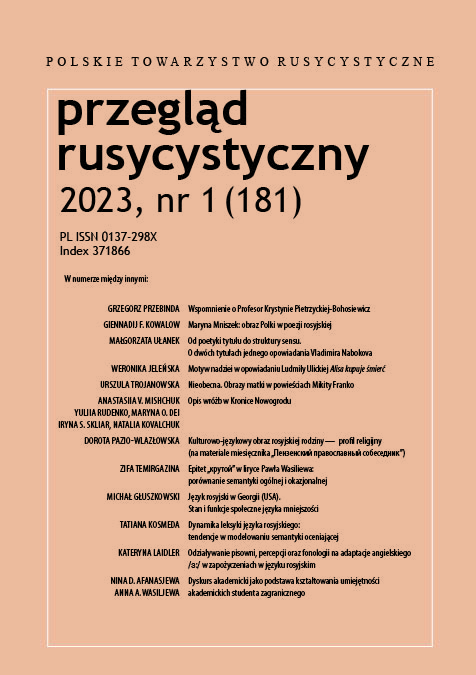THE INTERACTION OF ORTHOGRAPHY, PERCEPTION,
AND PHONOLOGY IN THE ADAPTATION OF E /Ɜ:/ IN LOANWORDS INTO RUSSIAN
THE INTERACTION OF ORTHOGRAPHY, PERCEPTION,
AND PHONOLOGY IN THE ADAPTATION OF E /Ɜ:/ IN LOANWORDS INTO RUSSIAN
Author(s): Kateryna LaidlerSubject(s): Phonetics / Phonology, Comparative Linguistics
Published by: Polskie Towarzystwo Rusycytyczne
Keywords: loanword adaptation; phonology; phonetics; acoustics; orthography; Russian; English
Summary/Abstract: In the process of loanword nativization, foreign sounds are inevitably altered so as to comply with the phonological principles of the borrowing language. There is, however, an ongoing debate as to whether such modifications are attributable to the phonological similarity between the source and the target segments, their acoustic closeness, orthographic conven- tions of the languages involved or an impact of additional extralinguistic factors. The issue seems particularly relevant in the case of those sounds whose adaptation to the target language involves several changes. The present paper deals with the issue of the so-called British English long schwa adaptation in loanwords from English into Russian. E /ɜ:/ nativiza- tion poses an interesting research problem due to its lacking a single phonologically or phonetically closest equivalent in Russian. Thus, considerable variability can be observed in how it is adapted. The present paper aims to examine the major mechanisms and patterns of E /ɜ:/ nativization in Russian loanwords and shed some light on the interplay of phonology, acoustic similarity, and orthography. Towards this goal, the major adaptation scenarios of 200 established loanwords con- taining E /ɜ:/ have been compared to the results of an online experiment in which 41 native speakers of Russian with no. command of English listened to a list of English words containing the sound in question in different segmental contexts and were asked to transcribe them using Cyrillic characters. The analysis demonstrates that while established loanwords are often influenced by orthography, spelling-based adaptations are inevitably reinforced by phonology and in some cases acoustic similarity. Moreover, a number of such adaptations is marginal if they are not supported by either phonology or phonetics, and the most common substitutes show an interplay of all three factors. Hence, our findings shed some light onto the nature of /ɜ:/ nativization in the Russian language as well as add to the debate of the loanword adaptation phenomena in general.
Journal: Przegląd Rusycystyczny
- Issue Year: 2023
- Issue No: 181
- Page Range: 180-206
- Page Count: 27
- Language: English

